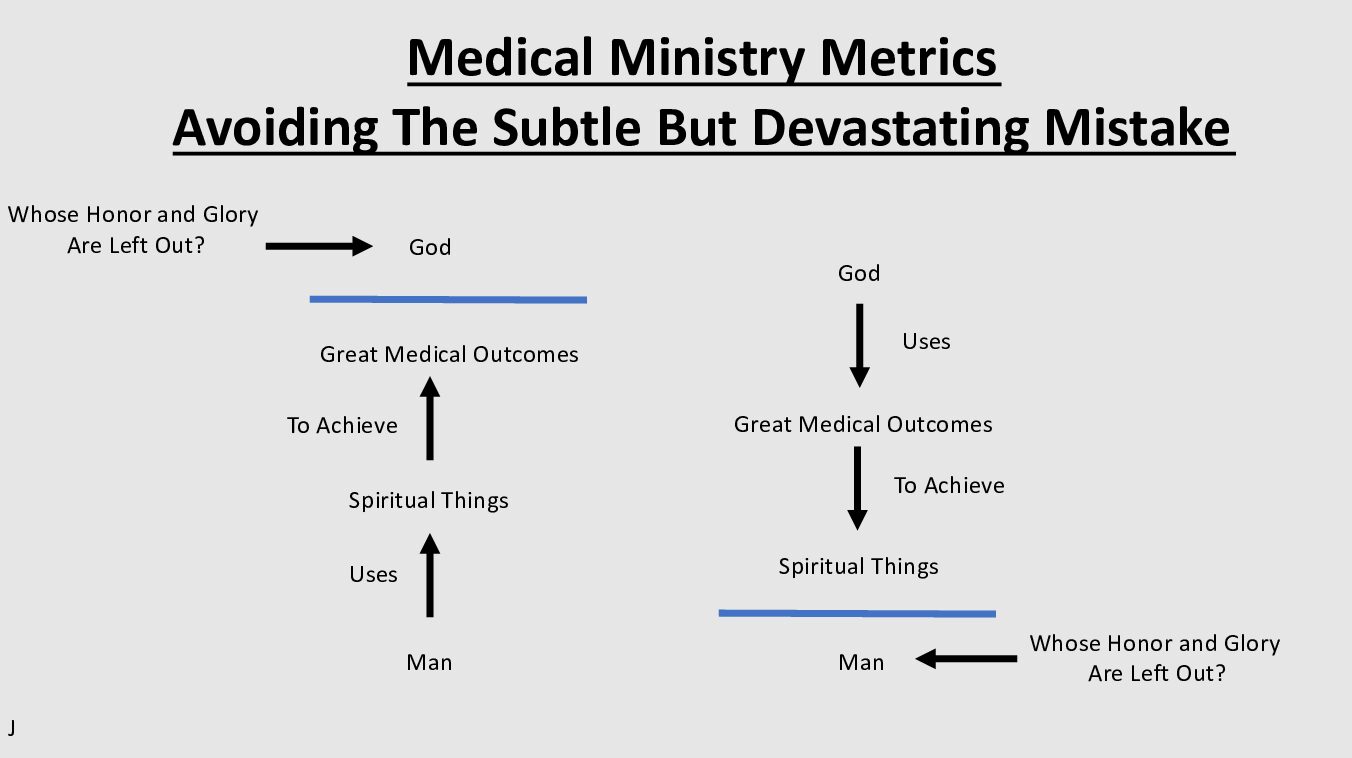Avoiding A Subtle But Serious Error
We all want to see medical work and ministry come together in a way that truly honors God. But there’s a subtle mistake that’s easy to miss—one that can completely derail the real mission of medical ministry. It’s a trap I’ve seen again and again, and one that I nearly fell into myself.
Two Ways to Approach Medical Ministry
Let’s talk about two ways medical and spiritual work can be combined. On the surface, they look similar, but they couldn’t be more different.
- Using spiritual tools to get great medical results.
- Using great medical results to accomplish spiritual goals.
Sounds like a minor distinction, right? But that small shift changes everything. It changes who’s in charge, what the focus is, and ultimately, what we’re working toward.
In the first approach—which is the one most hospitals use—spiritual things like prayer, chaplain visits, and faith-based encouragement are tools in the doctor’s toolkit. The goal is simple: better medical outcomes. Health improves, satisfaction scores go up, and administrators are happy. This approach makes sense in a business model. Even secular hospitals can get behind it because it aligns with measurable business success.
But the second approach flips the script. Instead of starting with human effort, it starts with God. Here, great medical outcomes aren’t the goal; they’re just a means to an end. And that end is leading people to Jesus. In the end, it is giving people a picture of a God who loves and cares for them. Here God just uses great medical outcomes to impress people with this fact.
The Moment It All Clicked for Me
I remember sitting in a room full of physician-pastor teams at a special conference. The energy was high. We had been invited by our conference health director to explore how we could better integrate ministry and medicine. The lineup of speakers was impressive—seminary professors, healthcare leaders, and even a representative from a hospital system I had worked closely with.
When the hospital representative took the stage, he had an incredible PowerPoint presentation packed with statistics. He talked about how providers were incorporating spiritual interventions into their work, leading to better patient outcomes. People were nodding, smiling, and excited to see proof that medical ministry was making a difference.
But something about it didn’t sit right with me. I couldn’t quite put my finger on it, but I raised my hand anyway.
“The presentation was fantastic,” I said. “But I have one question—how does all of this help me complete the gospel commission?”
The room went silent. The speaker, who had been so animated, suddenly looked… blank. The pause stretched longer than it should have. And then, with a flat expression, he simply said, “I am not able to comment on that.” And sat down. Just like that, the Q&A was over.
I was stunned. Not just by his response, but by what it meant. It hit me like a ton of bricks—he couldn’t answer my question because the gospel commission wasn’t the goal of the program. It was all about great medical outcomes, and spiritual elements were just a tool to get there.
Why This Matters More Than We Realize
This is why we need to be so careful. It’s easy to be excited just because doctors and pastors are working together and using spiritual language. But if we’re not paying attention, we might be heading in the wrong direction—putting all our energy into the wrong goal, one moving in the opposite direction from where we wanted to end up.
So, here’s the big question we need to ask ourselves: What is the ultimate goal of our work and who is at the center of it?
If the ultimate goal is great medical outcomes, and we’re just using spiritual tools to make our jobs easier or our hospitals more successful, then we’re making a huge mistake. But if the ultimate goal is to complete the gospel commission, and God is at the center of our work, then we will see medicine as a way to open hearts to Him, and we’re on the right track.
A Warning from Scripture
There’s a Bible story that serves as a serious warning. In Acts 8, Simon the Sorcerer saw the power of the Holy Spirit and wanted to buy it—not to serve God, but to elevate himself and accomplish his own goals in life. Peter rebuked him sharply: “Your heart is not right before God.”
Are we, in a modern sense, doing the same thing? Are we trying to “buy” spiritual power just to make our hospitals more successful? If so, we’re in dangerous territory. The power of God isn’t something we can manipulate for our own purposes—it’s the very foundation of what we’re called to do.
The Real Mission of Medical Ministry
Great medical outcomes are important to achieve for our patients, but they can’t be the only and final goal. If we aren’t intentional, we’ll settle for a mission that falls short yet think we are accomplishing the whole mission just because we are using spiritual language and tools. Ultimately, we need to remember that we’re not here just to heal bodies—we’re to use our opportunities to lead people to Jesus.
It’s easy to drift toward the wrong goal, especially when all the elements look right on the surface. But we have to stay focused. We are called to complete the gospel commission. And that means making sure our medical work is always pointing people back to Christ, not just better lab results.
Let’s not get caught in the trap of using God’s tools for human goals. Let’s make sure we’re doing His work, His way.


Leave a Reply